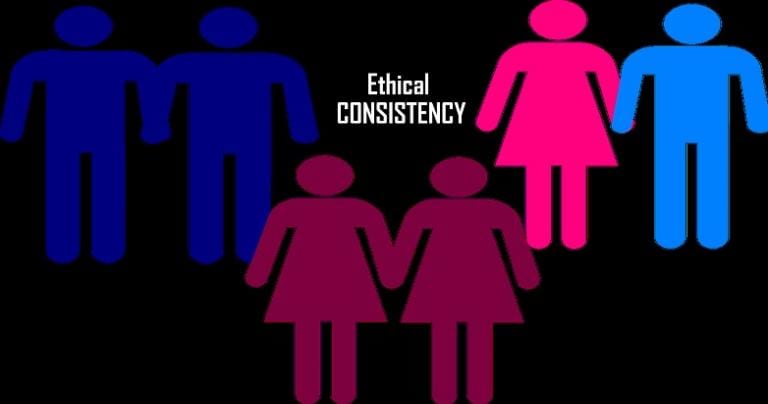
Homophobia forces many Christians to disproportionately apply ethical gravity to two obscure Greek terms while neglecting other biblical vices.
Can you imagine traveling back to the first century Mediterranean world in a time machine and discussing homosexuality with Paul (or Jesus)? Let’s say you did that. Imagine yourself talking with Paul (or Jesus!) about 21st-century studies on the biological, psychological, and psychosomatic dimensions of sexuality and homosexuality.
Say that, in your conversation, you informed Paul about “X” and “Y” chromosomes and mentioned that possibly these invisible things called “genes” determine gender and sexual orientation. And imagine that also in your conversation, you distinguished sexual orientation from sexual conduct.
What would Paul (or Jesus) make of that? Along with anyone from his day, he would be clueless. This is because Paul (like Jesus) belonged to a very different cultural world than ours. Sexual acts and gender, the way we conceive of them, would be unimaginable to anyone from Paul’s time. They would be to them as would aluminum foil, laptop computers, and Disney World.
“But at least we could discuss Natural Law with Paul!” some might mistakenly believe. Don’t be anachronistic. That concept was also foreign to Paul’s world. Watch the video here to understand why—
Ethical Consistency & the Natural Law
Natural Law theory begins way after biblical times. Whatever ethical consistency it has, that’s what informs the official Catholic position on homosexuals and so-called “disordered” natures. But the Bible? This ancient Mediterranean library doesn’t know any homosexuality or sexual orientations. Concerning same-sex coitus, biblical evidence is scant, ambiguous, and conditioned by culture alien to modern times. Consequently, Scripture cannot provide a foundation for any 21st-century ethic of homosexuality.
In other words, to form a case either for or against the morality of homosexuality goes beyond fundamentalism and Bible quotes. This is because the evidence must originate outside the Bible.
But that doesn’t stop fundamentalists relying on six scriptural passages often misused as used as proof-texts for the sinfulness of homosexual acts, or even homosexuality itself. We dealt with one of these famous passages in a previous post, 1 Corinthians 6:9-10. Because “a proof-text without context is a pretext,” I will be devoting a single blog post to all five other “proof-texts.”
Ethical Consistency & 1 Corinthians 6:9-10
But before doing so, I need to bury in the dirt fundamentalist reliance on 1 Corinthians 6:9-10. There isn’t a drop of ethical consistency involved. So I feel obligated to do this given the wild and worried responses to my recent post on the Patheos Facebook page. Many found themselves distraught over possible disastrous ramifications of…
- Rightly understanding two obscure and much-abused Greek words, malakoi, and arsenokoitai.
- That nearly all translations of these two terms reflect modern psychological concepts anachronistically attributed to Paul and his source.
- The fact that there is more to homosexuality than male-to-male coitus and female-to-female coitus.
- Reading 1 Corinthians 6:9-10 in light of the historical, social, and cultural differences separating Paul’s social and cultural horizons from our post-Enlightenment, western, industrialized world.
- The fact, contrary to popular, nonscholarly opinion, that homosexuals, heterosexuals, and bisexuals are NOWHERE in the Bible, just like “sexual orientation” and “sexual practice,” are likewise absent.
Ethical Consistency & Scripture Reading
I beg my fellow Catholic Bible readers to strive for ethical consistency. Likewise, I beg them to follow Dr. John Elliott’s call to be consistent in their reading and interpreting seemingly obvious passages. To see what he means, look carefully again over 1 Corinthians 6:1-11—
1 Corinthians 6:9–10
Do you not know that unjust persons will not inherit the kingdom of God? Do not be deceived. Neither immoral, nor idolaters, nor adulterers, nor malakoi, nor arsenokoitai, nor thieves, nor the greedy, nor drunkards, nor revilers, nor robbers will inherit the kingdom of God.
What is the function of this list of vices? Is Paul’s focal issue sexual activity? Sexual sins? People being “perverse” in sexual ways? Nope. In context, Paul instead uses his list to illustrate types of persons, all unjust or unrighteous, who will not inherit Israelite theocracy.
CONTEXT is KING!
In 1 Corinthians 6:1–11, Paul responds to a legal problem producing massive social ramifications for the Jesus group at Corinth. Believers took each other to Gentile courts of law, thereby presenting their cases to unjust judges in Paul’s view (6:1–8). But Paul says that these unjust outsiders have no part in the kingdom of God (6:9a). So then he illustrates unjust persons and behaviors (9b–10). Therefore his focus in 1 Corinthians 6:1–11 is preservation and enhancement of the unity of the Jesus group. How? By settling or eliminating brotherly disputes INSIDE, away from those Gentile outsiders.
For the sake of ethical consistency, look over all the terms in that list—

Why place all the moral weight onto a dubious translation of the two obscure Greek words, meanwhile ignoring the other items of this Pauline vice-list? The culprit must be hypocrisy and ignorance. Folks, we desperately need consistency and constraint in interpreting this passage. There are terrible theological and ethical outcomes spawned by our disrespectful readings.
History Lesson on Ethical Consistency
What does an honest exploration of how this passage has been translated, read, interpreted, and ethically applied for 2,000 years reveal? Tragically, subjectivity and selectivity have been the guiding principles.
Basically, different readers experiencing various situations gave the vices in Paul’s list different gravities. Throughout Church history, things changed. Therefore, sometimes idolatry and greed were considered “mortal” sins, but not always. This continues into modern times. Not too long before the Age of Trump, many Christian groups understood adultery as grounds to bar someone from Communion or legal divorce (or annulment).
By the way, does ex-communication really work in 2020?
Lack of Ethical Consistency
Consider that serial polygamist Donald Trump is hailed as God’s Chosen One by a frightful many U.S. Christians. Many “Bible-believing” churches permit divorced ministers to remain in ministry, despite Mark 10:2-12. Maybe there are good reasons not to Jesus’ understanding of marriage and divorce is entirely applicable to folks today? But then, wouldn’t that apply to other situations as well? We need ethical consistency, folks!
Meanwhile, hiding under a pro-life banner, U.S. bishops give veiled endorsements of a disgraced POTUS. Donald Trump, if James Comey is to be believed, was blackmailed by Russia because he enjoys being defiled by Russian hookers. He’s on tape celebrating his celebrity privilege allowing him to sexually harass and molest women. But vote “pro-life!”—where “pro-life” means a voting for a thief and a bully who cheats at everything. Someone who lies like the Niagara Falls pours water, a despicable narcissist with a horde of brainwashed idolizers.
How about that for ethical consistency?
Ethical Consistency & the Hierarchy
Wage theft, whether moral or legal, is considered virtuous by many bishops and pastors. I have personally suffered from this crime against Jesus (you know, the Body to which you and I belong?). For seven years, I worked at a South Florida parish where a priest before stole millions. I guess this justified his replacement overworking and withholding just pay from myself and my coworkers, huh?
My next job was the first decent pay ever in my 21 years doing ministry work in South Florida. Right after my hire, the pastor, a real tyrant to his staff, got removed for stealing hundreds of thousands of dollars from the community. Many of these priests “set up for failure” get transferred to some place remote, but that’s about all. Can you imagine if a lay employee did this? Where is the ethical consistency there?
How many Catholic dioceses exclude thieves and greedy priests? Not too many, by my count! Like when a pastor, unhappy with his life, takes advantage of his parish’s funds, cooks the books, and purchases an expensive home in which to live with his legal husband? We are talking for over a decade, folks. Do you even know this is going on? It is!
Inconsistent with the Ethical Application
Given all that, how curiously inconsistent we are when it comes to 1 Corinthians 6:9-10 and malakoi and arsenokoitai. We anachronistically misunderstand these terms as referring to “homosexuals” (male and female) engaging in same-sex sexual relations. But think about how few Christian denominations would permit such people engaging thus to remain ministers? Or to join a ministry?
Why is all the moral obsession and weight placed by so many Christians on the “evils” of homosexuality? There isn’t any biblical basis. What if it is merely personal dislike and fear? What if it’s just homophobia and bigotry? Where is the ethical consistency in that?
Add that to a theologically-justified delusion of super-morality powers fundamentalists believe they have. With such a mix, whatever your pet peeve or phobia is, place all the weight there.
Should homosexuality really deserve this hyper-focus? Why are gays, lesbians, bisexuals, and transgender persons ranked so high to so many U.S. Christians hateful agendas? It’s a complicated mess, and one without any biblical support. And the mess gets worse given our lack of ethical consistency, the lightness we treat the more apparent items on Paul’s vice-list.
1 Corinthians 6:9-10 & Ethical Consistency
If you attempt to discover any theological and ethical significance in 1 Corinthians 6:9-10 and the five other often-cited passages, you better weigh the vices equally! That’s what Paul did! Don’t you dare single out the obscure malakoi and arsenokoitai while ignoring the other unjust people Paul slams! Give all the vices listed equal importance.
Oh, what’s that I hear? You don’t want to exclude idolaters, thieves, drunks, robbers, and greedy folks? Make allowances? Be forgiving? How Christian of you! But forgive me for demanding that you do the same for malakoi and arsenokoitai, regardless to whom those words refer.
More later…











